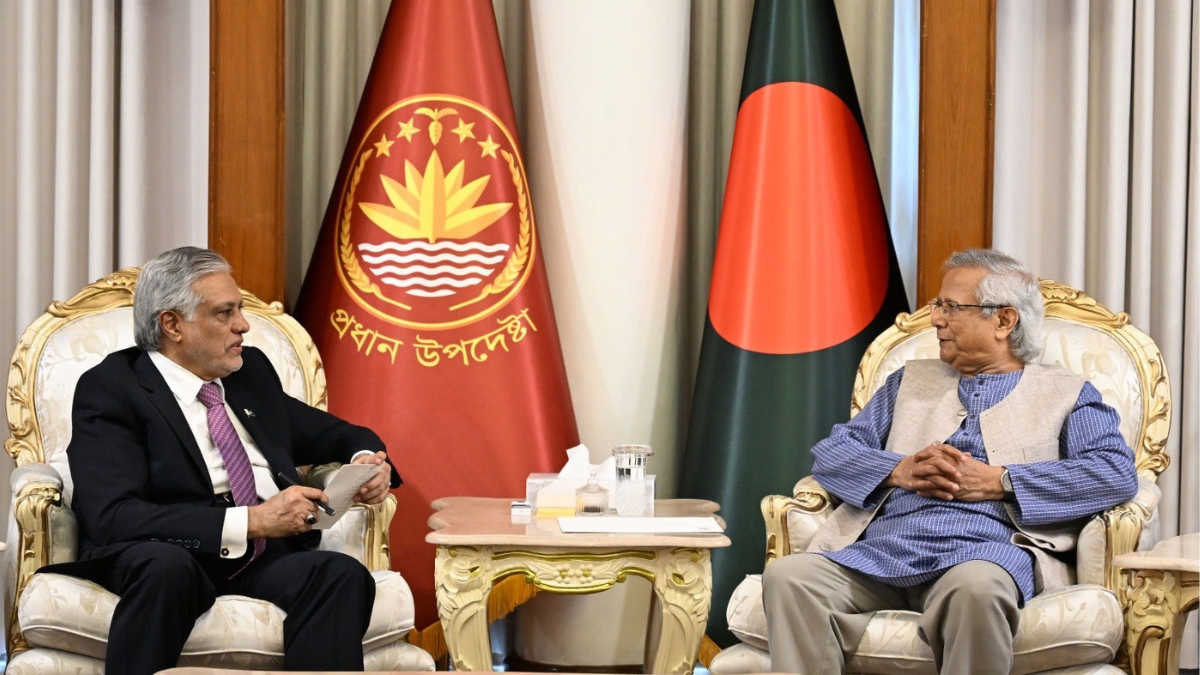Ishaq Dar’s Dhaka Visit Rekindles Tensions Over 1971 Bangladesh Genocide By Pakistan

Pakistan’s FM Ishaq Dar meets Bangladesh’s Chief Adviser Muhammad Yunus at the State Guest House Jamuna in Dhaka, as unresolved wounds over the 1971 genocide overshadow efforts at diplomatic rapprochement. Image courtesy: X.com/ChiefAdviserGoB
Pakistan’s Foreign Minister and Deputy Prime Minister Ishaq Dar’s recent visit to Bangladesh, the first in over a decade, was meant to reset bilateral ties. However, instead of bridging gaps, the visit has reignited old wounds as Dhaka firmly raised the unresolved issue of the 1971 Bangladesh genocide carried out by the Pakistan Army.
During his two-day stay, Dar met leaders from various Bangladeshi political parties, including the BNP, Jamaat-e-Islami, and the newly formed National Citizen Party (NCP) backed by interim government chief Muhammad Yunus. While the agenda focused on trade, investment, and reviving SAARC cooperation, the shadow of 1971 loomed large over discussions.
Why does Dhaka reject Pakistan’s “Resolved” Claim on the 1971 war?
Dar told local media that the issue of the 1971 war had been “resolved twice,” first in 1974 through a tripartite agreement involving India, and later when then-President Pervez Musharraf expressed “regret” during his visit to Dhaka in the early 2000s. However, Bangladesh’s Foreign Affairs Advisor Touhid Hossain dismissed the claim outright.
“I definitely do not agree. If we had agreed, the problem would have been resolved,” Hossain said, underlining three outstanding issues. These issues are a formal apology for the 1971 genocide, settlement of pre-independence financial assets, and repatriation of stranded Pakistanis still in Bangladesh.
Bangladeshi officials reiterated that without recognition of the genocide, bilateral ties cannot move forward meaningfully.
How did Pakistan unleash atrocities in 1971?
The 1971 Liberation War, which led to the creation of Bangladesh, remains a painful chapter in South Asia’s history. Pakistan’s military launched ‘Operation Searchlight’ in March 1971 to crush Bengali aspirations for autonomy. The campaign resulted in mass killings, targeted executions of intellectuals, and widespread sexual violence.
Independent estimates suggest that up to three million Bengalis were killed and over one million women subjected to sexual assault by Pakistani troops. The atrocities have been internationally recognised as one of the worst genocides of the 20th century.
For decades, Dhaka has sought a formal apology from Islamabad, but successive Pakistani governments have avoided full acknowledgment, offering instead vague expressions of “regret.”
What’s been the political and diplomatic fallout of Dar’s remarks?
The genocide issue has historically strained Bangladesh-Pakistan relations. Under Sheikh Hasina’s Awami League government, ties plummeted further when Dhaka initiated the trial of local collaborators of Pakistani forces in 2010. The trials, widely supported within Bangladesh, drew criticism from Islamabad.
Dar’s visit comes after Hasina’s ouster in August 2024, which has created space for Islamabad to re-engage with Dhaka. However, critics argue that the Yunus-led interim government is showing weakness by not pressing Pakistan harder for accountability. The Awami League condemned Dar’s visit as a betrayal of Bangladesh’s Liberation War sacrifices.
What is Bangladesh’s precondition for reconciliation with Pakistan?
Analysts note that Pakistan’s bid to expand economic and political ties with Bangladesh will remain incomplete without addressing the genocide question. While trade agreements and MoUs were signed during Dar’s visit, the absence of any reference to 1971 in Pakistan’s official statements underscores the lack of political will in Islamabad.
For Bangladesh, the memory of genocide remains central to its national identity, and reconciliation with Pakistan will only be possible once Islamabad accepts responsibility. Until then, the legacy of 1971 will continue to overshadow every attempt at diplomatic engagement between the two nations.







